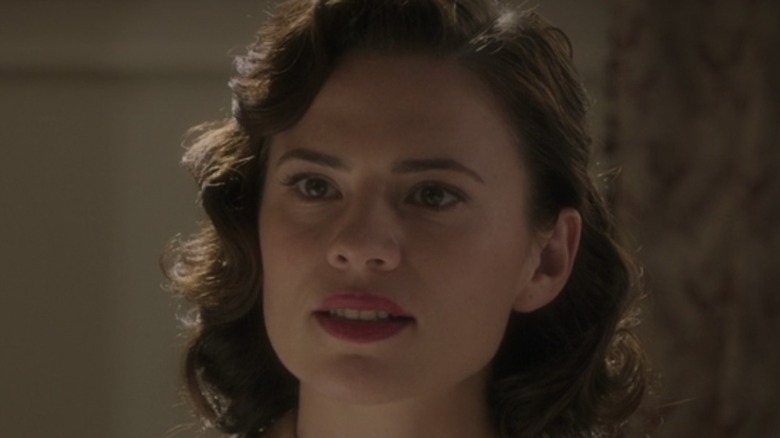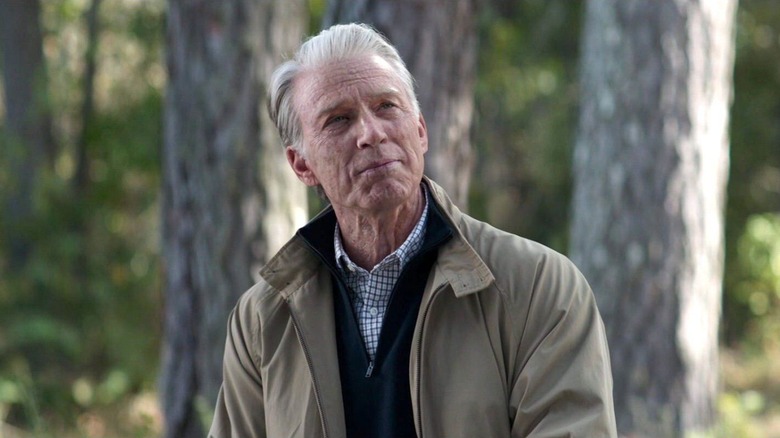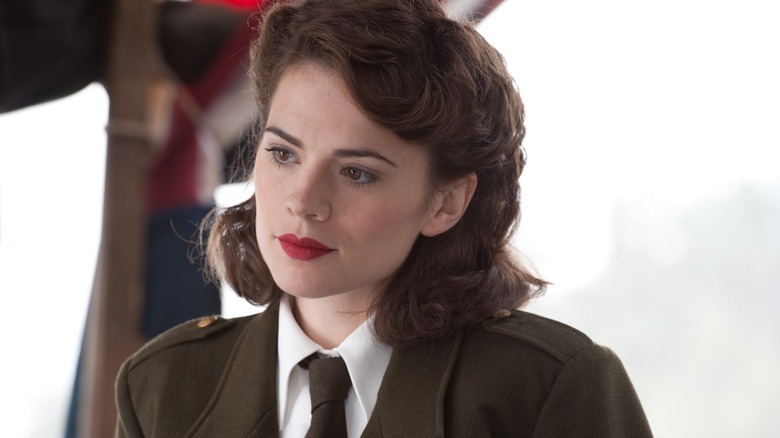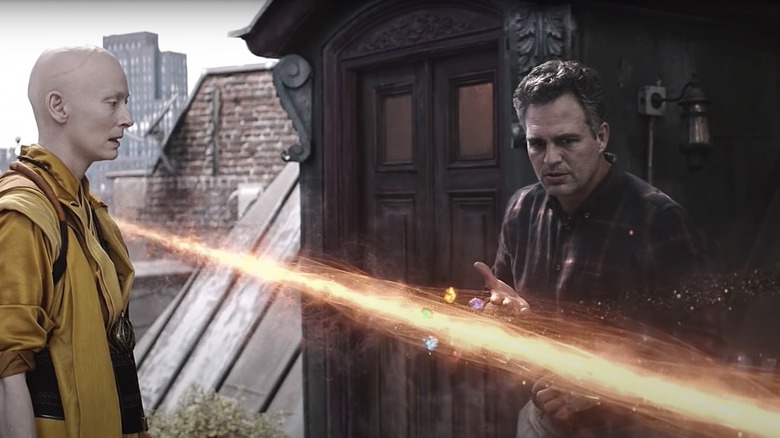What Only Agent Carter Fans Know About Captain America's Time Travel
As you may know, time travel in television and movies can get complicated. Just look the "Back to the Future" series, or "Bill and Ted's Excellent Adventure," or all that stuff that happened in "Star Trek: The Next Generation," or the "Terminator" timeline ... well, you get the picture. You can get a headache just trying to figure out exactly what happened and when, and what didn't happen, based on characters messing with time.
In the Marvel Cinematic Universe, time travel has appeared in multiple storylines, as when Marvel's Agents of SHIELD jumped across time with the help of the Time Di-Alla, or when Chase Stein (Gregg Sulkin) of "The Runaways" built a time machine in order to prevent Yorkes' (Brigid Brannagh) death. And, as fans will remember, Steve Rogers (Chris Evans) chose to remain in the past with the love of his life, Peggy Carter, once the universe had been set straight and he had been tasked with returning the stones to their rightful time periods.
But have you ever considered how Cap's decision might have messed up the timeline? Considering that Peggy Carter did have a life that was partially documented in the 18-episode ABC series "Marvel's Agent Carter," set just in 1946 and 1947 — not long after the events of "Captain America: The First Avenger" movie in 1942-1945 — his effects on the events of the past are super-important. Here's what fans of the short-lived "Agent Carter" know about Steve's time travel that everyone else might not have glommed onto yet.
What if Steve re-entered Peggy's life before Agent Carter's timeline?
Sussing out the results of time travel is no picnic. Fans know that Steve went back in time to spend the rest of his life with Peggy Carter — but when? And how did it affect Peggy's post-World War II career? It's actually rather important that he doesn't change stuff, because Peggy did some pretty significant things in "Marvel's Agent Carter."
As you may recall from events in "The First Avenger," Steve's plane goes down around 1945. Let's say he returns to a time just after he vanished, dances with Peggy, and whisks her away to their happy ending. This would be a disaster for the secondary timeline that Cap has just created, because in "Agent Carter," she prevented the murder of Howard Stark, father of Tony, before his son was even born. The non-existence of Iron-Man would be a total game-changer for the MCU.
To start with, it's uncertain SHIELD would have existed in its current form, as Howard Stark founded the organization in 1949 with her and Chester Phillips. War Machine wouldn't have existed, but then neither would Ultron, Vulture, or Whiplash. Captain America would probably have been killed by Loki, Thor wouldn't have joined the Avengers, the Scarlet Witch might not be who she is without the catalyst of Stark Industries driving her childhood hatred right to HYDRA's doorstep ... and that's just for starters. The Avengers may have looked much different, if they even existed, since Tony Stark helped put together the team, and who knows what would have happened when Thanos came around. If you consider how very important both Howard and Tony were in shaping the MCU, their absence would reverberate throughout Earth, space, and the Nine Realms, too.
But what if Steve tagged along, or waited for Peggy to finish doing her work?
However, we don't actually know when Steve Rogers ended up back at Peggy's side. It's very likely that he knows exactly how significant she is to the timeline, and wouldn't want to mess that up. So, there are other scenarios to consider. First, he might arrive back in 1945 and decide to become her partner-in-crime. We'd definitely like to see in an other-timeline reboot of "Agent Carter" where she has Steve to help her out.
Or, he could make himself scarce for a few years. That would allow everything in "Agent Carter" to take place... but that would have been risky, given that she thinks he's dead for two years, and she might have problems with the way he chose to drop back into her life after all that grieving (including relinquishing his vial of blood at the end of the first season — remember that?).
There's also the fact that Cap has just erased Peggy's future family — or did he? Actually, either of these theoretical scenarios could have saved the timeline and still ended up with Steve Rogers becoming the mysterious and un-shown husband that is referenced in "Captain America: The Winter Soldier," a notion which "Endgame" writer Stephen McFeely believes in, although he has stipulated that he doesn't know if Marvel agrees. "Chris and I are partial to the idea that Steve is part of a strange, unique time-loop where he has always been there. The husband that you very purposefully did not see at Peggy's bedside in 'Winter Soldier' is Chris' Steve. We have always thought that he was her husband. The movies you have been watching follow a line where he always goes back," he told Canada.com (via Cinema Blend).
How to look at time travel in the MCU
Actually, if you buy that Captain America has always been Peggy's husband, it might be bending the rules that were established for the MCU by "Endgame" directors Joe and Anthony Russo. You may recall that "Endgame" lays out exactly how time travel works, and it isn't anything like what "Back to the Future" postulates. Basically, Professor Hulk says, "If you travel to the past, that past becomes your future and your former present becomes the past, which can't now be changed by your new future."
The Ancient One similarly describes the effects of time travel in 2012, when the Hulk (Mark Ruffalo) comes to get the Time Stone from Dr. Strange and discovers that she is in possession of it. "The Infinity Stones create what you experience as the flow of time," she tells him. "Remove one of the stones, and that flow splits. Now this may benefit your reality, but my new one, not so much." The Hulk tells her that after using the stones, they can return each back to their current time as if they had never left.
Clear as mud, right? But basically, what they're saying is this: Every time a character goes into the past to change the timeline, it creates a new, divergent timeline that branches off from the original. So, going back in time doesn't hurt the present timeline.
But Captain America, at the end of "Endgame," is clearly part of the current, and main, timeline, despite everything. If you're still confused, simply remember this nugget of advice that Anthony Russo laid out at an appearance at a Smithsonian Institute event back in 2019 (via CBR.com): Time travel doesn't exist. It is simply a plot device. The end.



